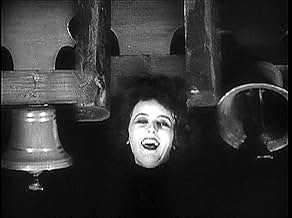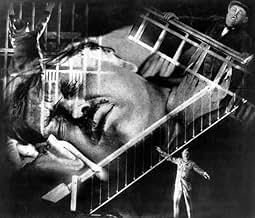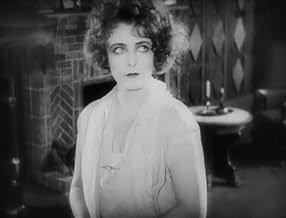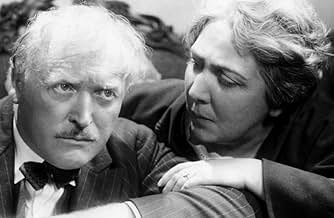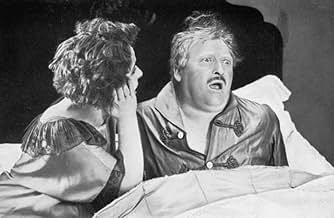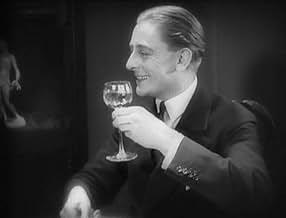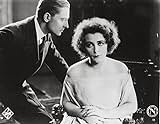AVALIAÇÃO DA IMDb
6,8/10
863
SUA AVALIAÇÃO
Adicionar um enredo no seu idiomaA scientist is tormented by an irrational fear of knives and the irresistible compulsion to murder his wife.A scientist is tormented by an irrational fear of knives and the irresistible compulsion to murder his wife.A scientist is tormented by an irrational fear of knives and the irresistible compulsion to murder his wife.
- Direção
- Roteiristas
- Artistas
Avaliações em destaque
Although it has an enormous reputation as a classic example of German Expressionist Cinema, "Secrets of a Soul" turns out to have very few of these pictorial elements. That reputation was obviously built on the opinions of critics who had not actually seen the movie but had referenced the illustration reproduced on the poster. It is not a still from the movie at all, but a composite made up by the publicity department.
Admittedly, we do see the various dreams individuallyand they are even briefly reprizedbut even so, they constitute but an extremely small part of the movie which mostly centers on the well-off but distinctly middle-aged hero's sudden aversion to his young and extremely attractive wife.
I realize that this was obviously not the scriptwriter's intention, as it appears from the flashback that the three participants are roughly the same age. The casting, however, particularly of the 25-year-old Weyher, as well as youngish Jack Trevor, makes nonsense of this supposition. We are forced to accept the movie in the way it appears on the screen, not in the way it was postulated in the minds of the screenwriters.
I suppose you could argue that the dreams are presented in an expressionistic fashion (though I would disagree), but you can't get away from the fact that they display little visual imagination. And in any event, they occupy very little screen time.
As the middle-aged lead, Werner Krauss does extremely well in conveying the domestic disparity he suffers with his young wife. He has obviously been married for at least five or six years and his attitude is not so much loving, as reserved, suspicious, ill-tempered and even resentful. As said, this was probably not the way Neumann and Ross intended, but it's the way Krauss plays the role and, more importantly, the way Pabst has directed it. So what have here is not so much expressionism, as a moderately gripping domestic drama.
Admittedly, we do see the various dreams individuallyand they are even briefly reprizedbut even so, they constitute but an extremely small part of the movie which mostly centers on the well-off but distinctly middle-aged hero's sudden aversion to his young and extremely attractive wife.
I realize that this was obviously not the scriptwriter's intention, as it appears from the flashback that the three participants are roughly the same age. The casting, however, particularly of the 25-year-old Weyher, as well as youngish Jack Trevor, makes nonsense of this supposition. We are forced to accept the movie in the way it appears on the screen, not in the way it was postulated in the minds of the screenwriters.
I suppose you could argue that the dreams are presented in an expressionistic fashion (though I would disagree), but you can't get away from the fact that they display little visual imagination. And in any event, they occupy very little screen time.
As the middle-aged lead, Werner Krauss does extremely well in conveying the domestic disparity he suffers with his young wife. He has obviously been married for at least five or six years and his attitude is not so much loving, as reserved, suspicious, ill-tempered and even resentful. As said, this was probably not the way Neumann and Ross intended, but it's the way Krauss plays the role and, more importantly, the way Pabst has directed it. So what have here is not so much expressionism, as a moderately gripping domestic drama.
This film appears to be a relative to the common horror film and beautifully carves out its closeness to the psychoanalysis: Everyone who's busy with that genre can benefit from the Pabst film. It becomes pretty obvious during the insane and worth seeing dream sequences which foreshadows an Andalusian dog shot three years later. In a period of several minutes they form a phantasmagoric island within the film, which is continually reverted to during the analytic situations. An aesthetic experience of an unique quality, tremendously powerful in its imagery. But on the whole, the film has the effect of being too reduced, even perhaps reducing, too trimmed and too coarse in respect of content.
At the beginning of the last century, Herr Sigmund Freud was a notorious Austrian neurologist and psychiatrist who was famous for his innovative studies of mental diseases and the complicated unconscious mind. This led him to found psychoanalysis and write "Die Traumdeutung" ( The Interpretation Of Dreams ) a turning point in modern psychiatry that claimed the path to the unconscious could be found in dreams. Since aristocrats usually have nothing in their minds, psychoanalysis could do little to fill such a void but was very useful for average people whose more accessible simple minds made them good subjects for these innovative psychiatric methods.
"Geheimnisse Einer Seele" ( Secrets Of A Soul ) (1926) , directed by Herr G. W. Pabst, an Austrian like Herr Freud, is about this new psychoanalysis, a subject in fashion in Germany due to the complex and confused Teutonic minds, that Herr Pabst efficiently and aseptically describes in this film.
The film is famous for its notorious dream sequence in which a chemistry professor's unconscious fears come to the surface and threatens his marriage. It is all connected to an incident in the neighbourhood and the return of his wife's cousin from India.
The first half of the film shows the tranquil and bourgeois life of the professor together with his wife and the (at first) unimportant events that little by little will affect the professor's unconscious and will take shape in a traumatic dream. This is the most unique and interesting part of the film, the late Expressionist dream sequence, a nightmare, a nonsense puzzle that during the second half of the film will be analyzed and described with the help of a psychoanalyst, natürlich!.
Herr Pabst, due to his Teutonic and organized human nature, describes and solves every little detail shown during the powerful dream sequence with the knowledgeable help of the psychiatrist of the film; a coherent, logical and aseptic analysis that lacks emotion and rhythm so there is no room for mystery. The story also has a conservative and too conventional happy ending that throws the film a bit off balance and is too predictable given the odd subject matter.
That's what happens when you are an open-minded and common person, your innermost secrets are easily revealed, so unlike the wicked, empty and inscrutable aristocratic minds.
And now, if you'll allow me, I must temporarily take my leave because this German Count must wake up.
Herr Graf Ferdinand Von Galitzien http://ferdinandvongalitzien.blogspot.com/
"Geheimnisse Einer Seele" ( Secrets Of A Soul ) (1926) , directed by Herr G. W. Pabst, an Austrian like Herr Freud, is about this new psychoanalysis, a subject in fashion in Germany due to the complex and confused Teutonic minds, that Herr Pabst efficiently and aseptically describes in this film.
The film is famous for its notorious dream sequence in which a chemistry professor's unconscious fears come to the surface and threatens his marriage. It is all connected to an incident in the neighbourhood and the return of his wife's cousin from India.
The first half of the film shows the tranquil and bourgeois life of the professor together with his wife and the (at first) unimportant events that little by little will affect the professor's unconscious and will take shape in a traumatic dream. This is the most unique and interesting part of the film, the late Expressionist dream sequence, a nightmare, a nonsense puzzle that during the second half of the film will be analyzed and described with the help of a psychoanalyst, natürlich!.
Herr Pabst, due to his Teutonic and organized human nature, describes and solves every little detail shown during the powerful dream sequence with the knowledgeable help of the psychiatrist of the film; a coherent, logical and aseptic analysis that lacks emotion and rhythm so there is no room for mystery. The story also has a conservative and too conventional happy ending that throws the film a bit off balance and is too predictable given the odd subject matter.
That's what happens when you are an open-minded and common person, your innermost secrets are easily revealed, so unlike the wicked, empty and inscrutable aristocratic minds.
And now, if you'll allow me, I must temporarily take my leave because this German Count must wake up.
Herr Graf Ferdinand Von Galitzien http://ferdinandvongalitzien.blogspot.com/
G.W. Pabst's fourth film "Geheimnisse einer Seele" (Secrets of a Soul, 1926) was the first film to tackle the subject of psychoanalysis. Even though a controversial subject, the film managed to make a profit. The filmmakers desperately wanted Sigmund Freud himself to join the production as an expert, but Freud strongly refused, not believing that the medium of film could do justice to his psychological theories. In this, he was probably right, since it's doubtful that things would be this neatly spread out in any person's mind.
Werner Krauss plays a bourgeois scientist, who has a wife, 20 years younger than him. There is a murder in their neighbor's apartment, and suddenly Krauss starts to feel an inexplicable fear of knives and also an urge to murder his wife. We have a dream sequence, that is well executed enough, but it doesn't leave any kind of mystery to the film, which tries really hard to be a mystery. Of course we still get to return to it once the protagonist receives psychoanalytical treatment. Doesn't really take Freud to interpret this dream, but maybe people in 1926 weren't yet tired of freudian cliches.
This film looks like a pioneering work, but its greatest value lies in the films that it may have inspired. The dream sequence brings to mind Hitchcock's "Spellbound" (1945), and the depiction of guilt resembled Fritz Lang's "M" (1931) a little. The hold Pabst has over his film is too pedantic, especially towards the end. But one thing is certain, he does really believe in the science that he tries to sell you, and the film's message about how one can heal from psychological illnesses just like any other, is a positive one.
Werner Krauss plays a bourgeois scientist, who has a wife, 20 years younger than him. There is a murder in their neighbor's apartment, and suddenly Krauss starts to feel an inexplicable fear of knives and also an urge to murder his wife. We have a dream sequence, that is well executed enough, but it doesn't leave any kind of mystery to the film, which tries really hard to be a mystery. Of course we still get to return to it once the protagonist receives psychoanalytical treatment. Doesn't really take Freud to interpret this dream, but maybe people in 1926 weren't yet tired of freudian cliches.
This film looks like a pioneering work, but its greatest value lies in the films that it may have inspired. The dream sequence brings to mind Hitchcock's "Spellbound" (1945), and the depiction of guilt resembled Fritz Lang's "M" (1931) a little. The hold Pabst has over his film is too pedantic, especially towards the end. But one thing is certain, he does really believe in the science that he tries to sell you, and the film's message about how one can heal from psychological illnesses just like any other, is a positive one.
Você sabia?
- CuriosidadesSigmund Freud, whose book "The Interpretation of Dreams" largely influenced this film, was approached to serve as a consultant on psychoanalysis. Freud declined, believing that film could not capture the complexities of the science of psychoanalysis.
- Versões alternativasThere is an Italian edition of this film on DVD, distributed by DNA Srl: "I MISTERI DI UN'ANIMA (1926) + OMBRE AMMONITRICI (1923)" (2 Films on a single DVD), re-edited with the contribution of film historian Riccardo Cusin. This version is also available for streaming on some platforms.
- ConexõesEdited into Die Geschichte des erotischen Films (2004)
Principais escolhas
Faça login para avaliar e ver a lista de recomendações personalizadas
Detalhes
- Tempo de duração
- 1 h 37 min(97 min)
- Mixagem de som
- Proporção
- 1.33 : 1
Contribua para esta página
Sugerir uma alteração ou adicionar conteúdo ausente

